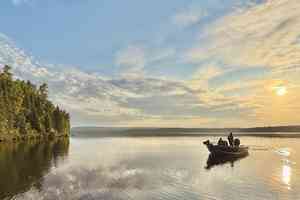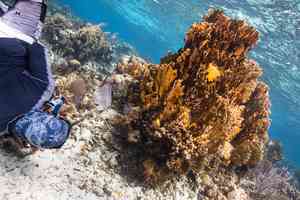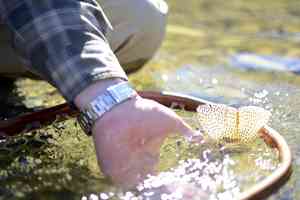Despite clear rights to stream access provided by their state's constitution, upheld halfway through the 20th century by their state Supreme Court and reaffirmed in 2014 by their Attorney General, New Mexicans are about to lose their right to fish a substantial portions of their state's public waters thanks to a new piece of legislation that New Mexico governor Susana Martinez is expected to sign into law by April 10. As a result, stream access advocates in New Mexico, neighboring Utah and beyond are asking anglers everywhere to send a clear message to the governor that she must use her veto power to put a stop to legislation that would strip the public of its right to recreate on many of its state's waters.
In 1945, a landmark case in New Mexico -- known as Red River Valley -- led to its Supreme Court clearly spelling out the rights of its citizens to recreational access to all waters. Citing their state's constitution in its decision, the court stated clearly that New Mexico anglers and others have the right to access fish, float or wade those waters, even where they are bordered on both sides by private lands. The decision noted, “The small streams of the state are fishing streams to which the public have a right to resort so long as they do not trespass on the private property along the banks.” Yet for decades, private landowners have stretched barbed wire fences across streams where they border national and state forest land and the State GameCommission has told anglers they could be cited for trespass if they fished waters that flow through private lands, ignoring the rights of the citizens of New Mexico's citizens to recreate on its waterways.
As recently as 2014, amidst challenges and questions about the incompatibility of access rights provided by the state constitution and regulations put forth by the State Game Commission and Department of Game and Fish, the state Attorney General issued an opinion further clarifying New Mexicans' right to fish their streams and rivers. In the opinion, the AG stated unequivocally that "The public’s right to use public waters for fishing includes activities that are incidental and necessary for the effective use of the waters. This includes walking, wading and standing in a stream in order to fish. Although, as Red River makes clear, a person may not trespass on private property in order to gain access to public waters, a person using public waters to fish, including incidental activities such as walking, wading or standing in a stream bed, is not trespassing.”

But, despite the seemingly unquestionable rulings and opinions of the state's lawmakers and courts, challenges to stream access have continued. Since the Attorney General's opinion in 2014, the New Mexico Wildlife Federation and state legislators have requested multiple times that the State Game Commission bring their regulations in line with the court's 1945 decision, only to have the commission refuse to even address the issue. New Mexico Wildlife Federation's Communications director Joel Gay noted, "we've been trying to get back to 1945, but we're stuck in 2015."
“It’s a sad day,” Gay continued, “when our top state officials are bending over backward to support a few private landowners rather than the people of the state and their constitutional right to fish and float our rivers and streams. Instead of pandering to special interests, our governor and Legislature should be standing up for everyday New Mexicans.”
Challenges to stream access in New Mexico have been primarily supported by private land and lodge owners which -- on the basis of State Game Commission regulations -- control access to water on rivers such as the San Juan, Chama and Pecos, where anglers have been barred from fishing for decades despite New Mexicans' existing right to access these waters. And if New Mexico's governor signs this new legislation -- Senate Bill 226, which passed in the New Mexico House of Representatives by a single vote -- into law, New Mexicans' constitutionally provided right to recreate on their state waters will be further muddied and farther out of reach.
The developing situation in New Mexico has striking parallels to the stream access battle in neighboring Utah, which the Utah Stream Access Coalition (USAC) has been a similar decision which stripped Utah anglers of their constitutionally provided right to access its public waters. Of the New Mexico legislation, USAC president Kris Olson noted, "For us in Utah, it’s disappointing, but it is predictable that other states would look to the 'Utah model for river privatization’ and try to do the same. We have made that argument for years as to why it’s important for people outside of Utah to be engaged and informed as to what USAC is doing. We’re fighting a movement - a perverse and pervasive movement - to privatize our natural resources. To take 'ours' and make it 'mine.' If New Mexico falls, it’s not a matter of if another state will lose stream access, but when. Access is tantamount to conservation, and I think that idea is starting to get more national attention, unfortunately because the people are starting to lose. It’s a discussion we need to be having - it’s a wake-up call."
Both Gay and Olson warn that SB 226 will lead to further battles on stream access and will require, according to Gay, "the public to foot the bill for defending its right to stream access instead of the state defending its constitutionally provided right to recreate on these waterways" -- through costly lawsuits and court cases. Other possible impacts include concentrated pressure on undisputed public tracts of water and a hit to New Mexico's $268 million dollar a year sport fishing economy.
Again citing Utah as a parallel, Olson warns that anglers and others are mobilized to fight for their rights to access, noting that "When Utah's stream access was taken in 2010, there was no USAC. That action by the legislature and governor dragged us out of the rivers and put us on the Capitol steps - and ultimately in the state district courts. We had to find counsel, we had to find ways to fund lawsuits, we had to find legislators willing to sponsor access friendly legislation, and we had to inform the public as to what they'd lost so they would join us in this fight, we had to mobilize industry support. We’ve done that now. One of our two lawsuits just finished trial in early March, and the other will go to trial in late August."
"Many of those legal issues at hand here will be at play in New Mexico, too. USAC’s counsel have become the experts on this issue. Our membership has grown from a rag-tag group to over 3,500 people, and growing every day. Both the fly fishing industry (AFFTA and Simms in particular) as well as the broader outdoor industry have stepped up to speak out against taking away access here in Utah. This is a conversation people are already having - and I think New Mexico can really benefit from the momentum and support for these issues that’s already in place. They’ll face their own hurdles, for sure, but there’s a lot we’ve figured out here in Utah that can apply. Of course, the best option would be to stop this bill on the Governor’s desk. The number one lesson we’ve learned is how much easier it is to keep a bill from becoming law than to overturn it once signed. Get a veto, and then return next session with reasonable, sensible compromise that everyone can agree with."
Gay added, “New Mexico should have the same right of recreational stream access as Montana’s citizens and visitors. The sky has not fallen because people can freely fish and float. But instead our state appears headed down the path taken by Utah, where it will take expensive and unnecessary litigation to get to the same point. We are hoping to avoid that, and we can – if the governor would just veto SB 226.”
To make your voice heard on the issue and tell Gov. Martinez to veto New Mexico SB 226, head here. Or, as the USAC suggests, "Call the Governor right now and tell her to veto SB 226. They are tallying votes in the office and your 30-seconds matters - 505-476-2200."






























Comments
Ken G replied on Permalink
I first came across the National Organization for Rivers (NORS) around 15 years ago and have used the info they give out to gain access to creeks here in Illinois.
After reading this, I checked their site. Latest post addresses the same issue. They include a form letter, phone numbers and the email addresses of a number of NM legislators. For those interested, I thought this might help.
http://www.nationalrivers.org/river-rights-in-new-mexico.html
Larry Johnson replied on Permalink
New Mexico Stream Access has now been clarified for all via SB 226
Unfortunately, the Utah Stream Access Coalition Board of Directors have it all wrong, no one in New Mexico will be denied access to fishing. The state will operate as it has for the last 85 plus years when fishing became a well utilized leisure time activity. I am a river land owner and one of the three principle citizens that worked for the clarification of property rights in New Mexico. Senate Bill SB 226 will save the taxpayers in New Mexico millions of dollars in law suits and will protect thousands of miles of river fishing in the state.
All states have a definition of stream or river access, some are very clear and well defined, others are more vague. Many states have similar definitions but most vary slightly from each other’s full or restricted river access policies. Two good examples would be Montana and Colorado. It all comes down to the definitive definition of ‘Private Property’ verses ‘Public Easements’ which are very clear from all legal stand points. All running water is public, i.e., owned by the citizens, managed and controlled by Federal, State and sometimes local governments. Some people do have water rights but no one owns the water.
In Montana, when you buy property with a river running thru it, it is clear on the property’s title, i.e., deed that all land under the river is NOT private property but an ‘easement’ of that deed. This means the public may access the stream bed via walking, floating or by anchored boat which is floating. You may not access the river by trespass via private property without the landowner’s permission. To wade the river legally, you need to gain access to the river via a public entrance such as a bridge or a public road that has public proximity to the high water line which would let you enter the river without touching ‘Private Property’. Once in the river you may move up or down river at will, up to the historical ‘High Water’ mark.
In Colorado you have a different set of rules. Again, going back to the ‘title and deeds’ of said properties that have streams and rivers running thru them. In Colorado, the water again is public but in this state, if the deeds of the property give a list of the acreage that is under the river as ‘private property’, then access it treated just as any other piece of land that is private property. So in this case, the land owner does not own the water but they do own the land under that water, which is their private property. This means the public may float over the private property and fish that water but they cannot touch the streambeds by any means, which would include wading, standing or dropping of an anchor. There is a caveat, you may touch the ‘private property’ incidentally to ensure safe passage, i.e., push off rocks. You may also use a paddle or oar to assist moving beached watercraft that may be temporarily stuck on a sand bar of rock. If the angler or public wants to wade the river or drop anchor to hold still and fish a specific spot, they will need the landowners permission first and without that permission they may be sited for ‘Trespass’.
Now for New Mexico…. It is being stated the bill in New Mexico, SB 226, restricts access to rivers and streams that cross over private property. This is totally false because New Mexico has operated on the same assumptions as Colorado for years; anglers do need the landowner’s permission to wade or drop anchor on rivers with deeds of that have said private property. This has been written in every New Mexico Department of Game and Fish Proclamation for as long as the department has been established. Land under the river is private property where deeds and title verify that fact.
So why now the need and justifiable passing of SB 226? It was a fact that the outgoing State Attorney General, Mr. Gary King, was running for Governor last year. In an unethical and un-researched act, he issued an attorney general opinion, not law, just an opinion, that the public could enter private property without permission as long as there was water over that private property. This opinion caused massive confusion for the public and the fishing community in general. The New Mexico Department of Game & Fish and its Commission knowing they barely had the resources and budgets to manage the public lands under their charter at this time were extremely concerned. They knew if this opinion was not challenged, it would open up thousands of miles of water of and create an unfetter assault by the public. If SB 226 was not passed these waters would have been devastated by over fishing and unchecked harvesting of fish with no civic controls, the NM Game & Fish commissioners knew they just did not have the resources to deal with the problem. In reality it was a Godsend that the bill did get passed and this will ensure that New Mexico rivers will fish well for generations to come. SB 226 struck down the incorrect AG Opinion and makes it clear for all citizens and the public to know what the law is. In reality nothing has changed and nothing has been taken from the public for there was nothing to take away in the first place.
In closing I know that ‘Stream Access’ is an emotional topic for the entire angling community. I myself like to see as much access for the public as possible. I let considerate members of the public fish and wade my private section of the river all the time and at no time do we ever impede those anglers or boaters floating over my private property. Should New Mexico change its charter on stream access from the Colorado model to something like the Montana model? Well, maybe someday but if this to happen it needs to be done the correct way, through legislation not through law suites. There are other options too, like the River Reach programs or Western Rivers Conservancy, where a mixture of private and public organizations buy or get property donated by the river land owners for the public to use. Maybe the State or Feds should offer the landowners incentives to open access. This would be the correct way to make change, for this is America, we don’t operate on a ‘bait and switch’ on its citizens. Landowners who invested in States like Colorado or New Mexico have a valid deed on property that they worked hard to acquire, they cannot be removed with an opinion. Right now the State of New Mexico, top consideration will be honoring those deeds as is legally correct to do. This now can be done and done with no misunderstanding with the signing of SB 226 to make the law clear.
With this explanation I ask Governor Martinez to sign SB 226 without hesitation.
Kind regards,
Lawrence W. Johnson Jr.
Owner: Soaring Eagle Lodge
info@soaringeaglelodge.net
Kris Olson replied on Permalink
Larry,
Interesting thoughts here. You're correct, that you own the property below the streams & pay taxes on it - the property below the river is in your deed, but you neglect the fact that your own constitution and the NM Supreme Court have very carefully clarified the easement that runs over your land, below the ordinary high water mark of the stream. The same document that protects your private property rights (the NM constitution) also protects public property rights, and that's the issue at stake here. Nobody wants to cross your property to get to the river - that's trespassing, and it's illegal. Similarly, littering and vandalism, if they were to occur, are also illegal and should be enforced. Anglers should always respect private property rights, and part of that is a courtesy to let the landowner know when they're present for a number of reasons. But whether or not they go to your door to ask permission, they are still within their constitutional rights to stand within the stream bed while utilizing their resource.
If the river floods, no doubt that public dollars will be used to mitigate the damage to your ranch. No doubt that public dollars went into stocking the fish somewhere in the drainage that crosses your property. So if the public bears the burden to maintain that river, why should the public have to pay more to utilize the river by 'incentivizing' the landowners? If you set up an access ladder to cross your property, that’s one thing, but that’s not what’s at stake here. We’re talking about accessing from public right of ways - such as pre-established public access sites from the NMDGF and bridges. Kudos to you for allowing people to access and use their river where it crosses your property, but forgive me for taking that with a grain of salt - the promise that access would remain open on private ranches in Utah was ‘forgotten’ as soon as HB141 was passed into law, and lodge/ranch owners realized they could be compensated if they joined the state Walk-In-Access program. Now even that program is seeing a dramatic decrease in enrollment, as people realize they can opt-out at any time and charge their own arbitrary rod fees from anglers. As far as the sky-falling claim that the rivers and streams will be decimated by the floods of anglers? Even if that baseless claim were true it's well within the law for the NMDGF to place additional restrictions - catch and release only, closures during the daytime heat, etc...
You listed 2 states, Montana and Colorado - both with vastly different constitutions from New Mexico’s. Here’s a couple more states - Idaho and Utah, with constitutions much more similar to NM. Property owners in Idaho also have a valid deed on their property below the river - yet their law allows anglers to move up and downstream below the ordinary high water mark with nary a conflict. That law has been in place for nearly 40 years. It was put in place in the 1970's after the IDFG and property owners sought to address potential conflicts and avoid costly legal battles. Perhaps such a law would strike a valid compromise in your eyes, too?
The situation you are facing in NM is more similar to the Utah case than you may be aware. In Utah, property owners have deed to the property below the non-navigable rivers and streams. In Utah, private property owners and lodges, such as yourself, argued before the legislature that the rivers have “always been private,” neglecting the Utah Constitution and 3 Utah Supreme Court decisions. Their arguments were based in rhetoric, not in fact. In Utah, private property owners succeeded in getting their bill passed, much as you are hoping to do in New Mexico. After 5 years the law is still being challenged after hundreds of thousands if not millions of dollars in litigation - a bill footed by the State, the USAC, and the very same group of private property owners who sought to restrict access in the first place. Indeed, this is America, where we don’t pull a “bait-and-switch” by taking public property rights that most didn’t know they had and disposing of them to private interests. Rather than doing such a back-door, last-minute, sneak the bill through tactic as happened at the end of the session, why not veto the bill and study it in interim? You seem like a reasonable man, and I have no doubt that you and your cohort could come to a compromise on access if you were to sit down with organizations such as the NMWF and hash out your differences. Have an open discussion, where anybody that has anything at stake can come to the table and say their piece, crafting a bill that addresses all concerns. This is the way that good laws are made that stand the test of time, and benefit future generations of New Mexicans.
Or, you can wait for the legal challenges to SB 226 to weave their way through the courts, and let people much smarter than you (or me) decide what’s right for New Mexicans based on the New Mexico Constitution and Supreme Court precedent. I’m no legal scholar, but that sounds risky.
Sincerely,
Kris Olson
Pages